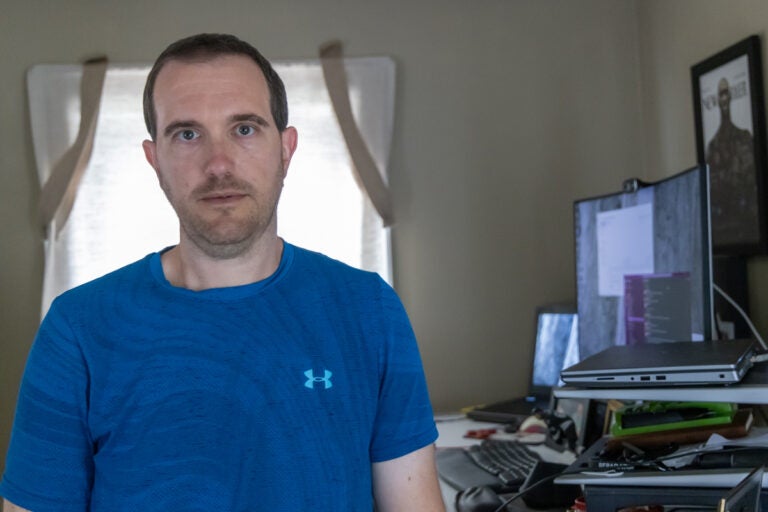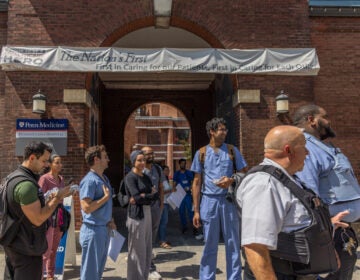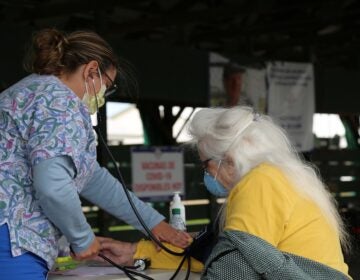Philly’s Benefits Data Trust shutters after 20 years. Laid-off workers say they still want answers
Hundreds of workers lost their jobs at the end of August and now some may have to apply for the same government assistance programs they helped others navigate.

Software engineer Matt Dragon, former employee of Benefits Data Trust, at his home office in North N.J. (Kimberly Paynter/WHYY)
From Philly and the Pa. suburbs to South Jersey and Delaware, what would you like WHYY News to cover? Let us know!
About two years ago, Matt Dragon took a job as a software engineer at a Philadelphia nonprofit organization with a mission that he wanted to support: helping people apply for public benefits when they can’t navigate the system to do it themselves.
People can struggle with the application process for a number of reasons, whether it be that they’re a senior citizen, aren’t technologically savvy or lack access to a computer or the internet.
“If the [nonprofit’s] mission had just been a website to apply people or a chatbot kind of thing, it wouldn’t have had the same appeal to me,” Dragon said.
Instead, individuals were given a phone number that routed them to the Benefits Data Trust call center where a social services agent would walk them through the process – for up to an hour – to apply for any public benefits they may qualify for including food, healthcare, internet and housing.
Now, instead of helping the public, Dragon is lending a hand to his old colleagues to find new jobs because their employer, Benefits Data Trust, crumbled unexpectedly two months ago.
As of August 24, the nonprofit laid off all its 273 employees and shut down its call center.
Dragon worries about the future of his former coworkers.
The lowest-paid workers, mostly in the call center, are at risk financially for falling through the social safety net that was laid bare during the COVID-19 pandemic. Even though they’ve spent countless hours helping others in need.
“It was a very collaborative, open, accepting kind of environment,” he said, especially for LGBTQIA+ individuals. But now “a lot of folks are really worried about finding a new place that’s accepting.”
It’s a wildly different reality than two summers ago, when the software engineer joined Benefits Data Trust.
At the time, it was given a $20 million unrestricted grant by philanthropist MacKenzie Scott — the ex-wife of Amazon.com founder Jeff Bezos.
In fiscal year 2021, the nonprofit collected $13 million in grants and generated $28 million in revenue. Its margin was $21,344, its financial filing shows. In fiscal year 2022, the most recent year where data was publicly available, the nonprofit collected $32 million in grants and generated total revenue of $45 million. Its margin was $11 million that year.
The nonprofit did not respond to a request for its most recent IRS 990 filing.
The organization’s supporters and funders included: the Bill & Melinda Gates Foundation, Ballmer Group, The Rockefeller Foundation, Robin Hood Foundation, Gitlab, The Pew Charitable Trusts and others.
During Dragon’s tenure, he became the principal software engineer and manager, so he experienced structural changes. He helped build internal technology tools from scratch to make the system more modular for several state governments. He first noticed a shift in company culture about a year ago.
“We started getting the message that launching the first state on the new system was sort of critically important. Then after that launched successfully in October [2023]. Then there was this push like okay now we have to get through all the states quickly [by end of 2024],” he said.
In the past 12 months, there were more signs of organizational struggle: grants expiring without replacements, three rounds of layoffs and the CEO Trooper Sanders suddenly resigned.
Even after the CEO Trooper left in mid-June, the organization told employees the board of directors approved a new budget and the chief financial officer would step up as the CEO, Dragon said.
“That was sort of presented as like, good news,” he said.
But that was short-lived. Five days later, employees were told they would be losing their jobs in two months.
“It was very unclear how we went from like, the board agreed to our new budget to — we’re closing. Once we got past those last set of layoffs, now other departments have been cut by like 50% so I did not anticipate a closure,” he said.
The organization’s founder, Warren Kantor, declined repeated interview requests for this news story. Kantor instead released a series of public statements.
“The leadership team and the Board [of directors] have been working tirelessly on two parallel paths: dissolution and potential partnership or acquisition to continue to deliver on our mission,” Kantor said. “It became clear that we had exhausted all avenues and would not be able to find a sustainable way forward for the organization in the time remaining. There was no malfeasance, misappropriation of funds, or fraud that caused BDT to wind down. The financial distress of the organization just simply could not be relieved in a timely manner, which forced our closure.”
Kantor said in the statement the leadership is collaborating with the Pennsylvania Attorney General’s office to handle the wind down process, as per the law “to end operations responsibly, with integrity, trust and transparency.”
He touted that the organization enabled vulnerable individuals and families to access $10 billion in public benefits over its two decades of operation. Kantor wrote that the cost to operate the nonprofit was always more than the value of the contracts secured with public entities, like colleges and governments.
Employees like Dragon are suspicious of the claims that the organization ran out of time and money so suddenly.
“They created the 60-day timeline themselves. They could have chosen to pursue an acquisition a year ago,” he said.
In the meantime, some longtime employees claim they are still owed money, such as unused and unpaid vacation pay and assert the organization is not following its own policies.
Mike Pearson, former associate director of contact center operations, worked at Benefits Data Trust for just shy of a decade.
When Pearson joined about 10 years ago, it was a smaller nonprofit with employees fresh out of college, with “a lot of us in our late 20s, early 30s,” he said. The staff had also grown from roughly 30 to 90 people.
“We were doing something really good, but it was hard. When people would call us, they’re in a tough place but you could generally offer some kind of assistance,” he said. “Our average calls are going to run between 20 minutes and 45 minutes to an hour. We’re not looking to have, you know, our agents push you know 100 calls a day, 200 calls a day.”
The nonprofit’s staff would grow when the organization secured a big contract for services, then shrink during leaner years. During the COVID-19 pandemic, the demand for help overwhelmed the workforce and eventually the federal subsidies helped offset the cost but that’s run out now.
“All of the states came to us asking for phone numbers. And we were just getting blasted,” he said.
Public calls into Benefits Data Trust spiked by 80%, which included first-time unemployment seekers, according to a charity profile by the University of Pennsylvania in 2022. In response, the organization doubled its workforce during the COVID-19 pandemic. About half of its revenue stems from donations to cover the cost to complete contracts awarded by the government.
Perhaps one of the organization’s downfalls was building technology products like eligibility screeners or chatbots that had limited use, Pearson said.
“We ended up spending a lot of engineering dollars and time on trying to deliver self-service products,” he said. “There would be a lot of time spent trying to plan and then it would turn into a rush to get it out the door.”
Pearson said the biggest change between former CEO Ginger Zielinskie and the most recent CEO Trooper was philosophy, from enabling state governments to help themselves to building solutions that could fix the broken social safety net.
Pearson said one thing that he noticed the company did with some of the $20 million gift was re-invest that money back into employees – especially call center workers – raising their minimum pay. He said that was a good idea but a significant investment in employee benefit packages with one-time funds seemed risky.
“My concern was is this sustainable because I don’t want to get dependent on this and have it go away,” he said.
In mid-June, Pearson said he was tasked to identify employees for a fourth layoff. That would have cut the workforce in half again. But it was before the closure was announced.
“Which was one of the most brutal experiences I’ve ever had in my life,” he said. “Then two days before we were supposed to make that announcement is when they told everybody we were all being laid off. I had a lot of frustration and anger.”
Some worry that such a situation could happen to other organizations if they don’t plan for the worst and hope for the best.
Teresa Harrison, an economics professor at the LeBow College of Business at Drexel University and academic director for the Gupta Center for Nonprofit Governance, said that there’s lots of unknowns right now.
“But it seems like something happened relatively quickly and [Benefits Data Trust was] not necessarily prepared for it,” Harrison said. “Risk management is key in nonprofits. We don’t often think of it that way.”
Without a concrete risk mitigation plan, organizations already running a thin operating margin could unexpectedly collapse. And the buck always stops with the board of directors.
But board members at the nonprofit, unlike their corporate counterparts, are often unpaid.
Harrison said even unpaid board members must ensure that they are regularly asking top executives what might happen in a worst case scenario and what the plan might be to stay afloat. What happens if the biggest grant source dries up suddenly, for example.
“It’s unfortunate that this particular case is happening because I worry that it will create undue skepticism of nonprofits who are able to use that [unrestricted grant] funding appropriately,” she said. “Two months is not enough time to figure out how to responsibly close or to responsibly merge.”
It’s unclear what exactly the fallout for the public access to government benefits might be.
Benefits Data Trust had contracts to help with benefit screening technology for most public benefits eligibility in Colorado, Maryland, Michigan, New York, North Carolina, South Carolina and Pennsylvania.
In early June, Philadelphia-based Independence Blue Cross and Benefits Data Trust announced a new program that would help individuals with Blue Cross health insurance apply for public benefits as one way to address social determinants of health care. That partnership has been canceled since the call center’s closure.
“We were disappointed to hear about Benefits Data Trust closing and are exploring other ways we can help our fully insured commercial members who have pre-diabetes and unmet health-related social needs enroll in public benefit programs,” said Dr. Seun Ross, executive director of health equity at Independence Blue Cross.
The Pennsylvania Department of Aging also had subcontracts with Benefits Data Trust through a contract call center operator Magellan since 2006. The subcontract was to connect with Pennsylvania seniors who are at least 65 years old, lower income and may qualify for drug cost subsidies through the Pharmaceutical Assistance Contract for the Elderly program. Those same individuals would be offered other public benefits such as SNAP, healthcare, property tax relief or home heating bill help.
As a result of the closure, Magellan will keep its contract for services but Benefits Data Trust won’t have a subcontract.
The Pennsylvania Department of Human Services subcontracted with Benefits Data Trust since 2013 to help individuals apply for SNAP, Medicaid, and the Children’s Health Insurance Program.
“BDT has served as a direct outreach partner and has been an important part of DHS’ efforts to help Pennsylvanians across the commonwealth access the benefits to which they are entitled,” according to a statement. “While this closure is a loss, this change is also an opportunity for the [Gov.] Shapiro administration to continue its commitment to helping seniors and low income families and to consider new strategies for increasing and improving benefits moving forward.”
Benefits Data Trust was working under a contract with the Tennessee Department of Human Services to help individuals apply for SNAP benefits – that contract is now ending because of the closure.
“At this time, [the state] does not plan to continue this work with a different partner,” according to a statement. “However we remain committed to exploring new opportunities to streamline and improve our delivery of services.”
In February 2023, four community colleges across Maryland contracted with Benefits Data Trust to help connect with 8,000 students with public benefits such as food for adults and children, health care and affordable internet.
Chesapeake College, a rural community college on Maryland’s Eastern Shore with 5,200 students, was one of those four colleges.
“We know that a student could run into some of these things like food insecurity and homelessness. And things like that might prevent them from being successful,” said Dr. Kamari Collins, vice president for student success and enrollment management at Chesapeake College.
The community college used some of its COVID-19 relief money to pay for the contract until the money ran out. Benefits Data Trust emailed nearly 600 students and texted about 300 students who might be eligible for benefits, according to the school.
The ability to reach hundreds of students was something the college couldn’t do alone.
“We had a dedicated phone line where we could refer the students to call and get instant support. That’s invaluable,” he said. “They were a pleasure to work with and [are] certainly missed.”
Ultimately, only about 27 students called in for help and seven applications were filed.
Dr. Collins said he considers the program a success because it was new and the awareness has strengthened the relationship between students and the college.
“This certainly helped us with the awareness piece. And even though we couldn’t continue with BDT after that year we’ve been trying to piece [resources] together,” he said.
Since then, the college has partnered with the Maryland Food Bank for mobile markets on campus to help students in need.

Get daily updates from WHYY News!
WHYY is your source for fact-based, in-depth journalism and information. As a nonprofit organization, we rely on financial support from readers like you. Please give today.










